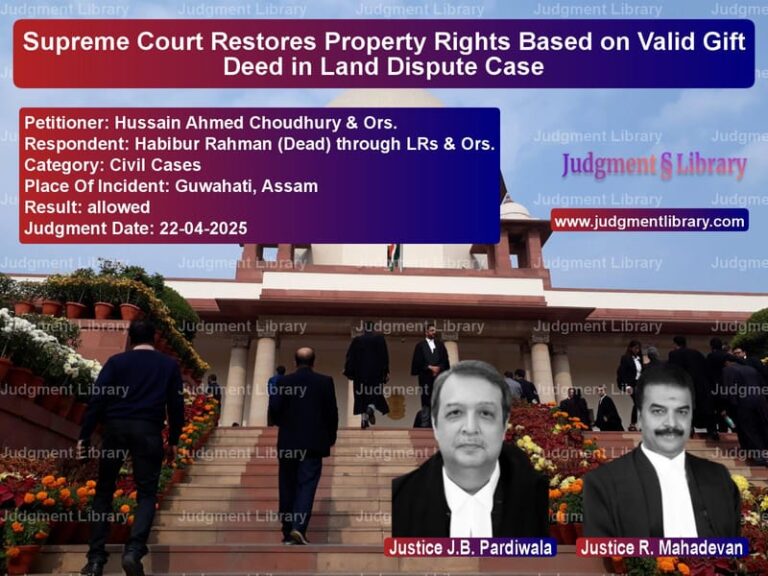Doctor’s Conviction Modified: Supreme Court Replaces Jail Term with Fine in Drugs Act Violation
The Supreme Court of India, in Palani v. The State of Tamil Nadu, examined a case under the Drugs and Cosmetics Act, 1940, where a doctor was convicted for failing to disclose the source of medicines found in his clinic. The Court modified the sentence, replacing six months of simple imprisonment with a fine of ₹1,00,000. This judgment reinforces the principle that punishment must be proportionate to the offense and considers the broader implications of sentencing individuals in cases of technical violations.
Background of the Case
The case originated when the Tamil Nadu drug regulatory authorities conducted an inspection of a clinic run by Palani, the appellant. During the inspection:
- Officials found 29 types of allopathic medicines stored without a valid license for sale.
- The doctor failed to disclose details about the source of the medicines.
- Authorities filed a complaint under the Drugs and Cosmetics Act, leading to prosecution.
Trial and Conviction
The Chief Judicial Magistrate convicted the appellant under:
- Section 18(c) read with Section 27(b)(ii) of the Drugs and Cosmetics Act (related to the sale/distribution of medicines without a valid license).
- Section 18A read with Section 28 of the Act (failure to disclose the source of drugs).
The trial court sentenced the appellant to:
- Two years rigorous imprisonment and a fine of ₹1,00,000 under Section 18(c) read with 27(b)(ii).
- Six months simple imprisonment and a fine of ₹20,000 under Section 18A read with 28.
- An additional penalty of ₹2,500 for newspaper publication under Section 35.
Appeal Before the Sessions Court
The case was challenged before the Additional District and Sessions Judge, where:
- The court set aside the conviction under Section 18(c), ruling that the prosecution failed to prove that the appellant was selling or distributing drugs.
- However, it upheld the conviction under Section 18A for failing to disclose the drug manufacturer’s details.
- The appellant was directed to receive a refund of the ₹1,00,000 fine imposed for the dropped charge.
Madras High Court’s Decision
The appellant further appealed to the Madras High Court, which dismissed the petition. The High Court ruled that:
- The conviction under Section 18A was valid, as the doctor failed to provide details of the medicine’s source.
- Since there was no procedural irregularity in the lower court’s decision, there was no need to interfere.
Supreme Court’s Analysis
The appellant approached the Supreme Court, where the case was heard by Justices B.R. Gavai and Sanjay Karol. The primary argument was not against the conviction itself but against the prison sentence. The appellant contended that:
Read also: https://judgmentlibrary.com/supreme-court-restores-criminal-case-in-jharkhand-land-fraud-dispute/
- He was a doctor and had no intention to violate the law.
- He did not engage in selling medicines but only stocked them for patient care.
- A jail term was excessive for a mere technical violation.
The Court relied on Mohammad Giassudin v. State of Andhra Pradesh (1977) 3 SCC 287, which emphasized that sentencing must consider the offender’s background, intent, and the nature of the violation.
Supreme Court’s Judgment
The Supreme Court ruled:
- The appellant’s failure to disclose the medicine’s source was a technical violation, not an act of criminal intent.
- Since the charge of selling medicines was not proved, a jail sentence was disproportionate.
- The sentence of six months imprisonment was set aside and replaced with a fine of ₹1,00,000.
- The exemption from surrendering was made absolute, allowing the appellant to avoid serving time.
Key Takeaways from the Judgment
- Proportionality in Sentencing: The ruling reaffirms that courts should impose punishments that align with the severity of the offense.
- Recognizing Technical Violations: Not every regulatory lapse warrants imprisonment, especially when no harm is caused.
- Judicial Precedents: The decision follows established principles from past judgments concerning fair sentencing.
- Relief for Medical Practitioners: The verdict acknowledges the unique role of doctors and prevents excessive penalization for minor infractions.
Implications of the Judgment
This decision is likely to impact future cases under the Drugs and Cosmetics Act, particularly:
- Encouraging courts to assess intent and impact before imposing strict penalties.
- Providing clarity on distinguishing between possession and sale of medicines.
- Establishing a framework for leniency in sentencing for professionals with no criminal intent.
Conclusion
The Supreme Court’s ruling in Palani v. State of Tamil Nadu underscores the importance of fair sentencing. While upholding the conviction, the Court ensured that the punishment was appropriate to the offense. By substituting jail time with a fine, the judgment maintains legal accountability without unnecessary harshness. This case serves as an important reference for similar regulatory infractions in the medical field.
Petitioner Name: Palani.Respondent Name: The State of Tamil Nadu.Judgment By: Justice B.R. Gavai, Justice Sanjay Karol.Place Of Incident: Tiruvallur, Tamil Nadu.Judgment Date: 14-02-2024.
Don’t miss out on the full details! Download the complete judgment in PDF format below and gain valuable insights instantly!
Download Judgment: palani-vs-the-state-of-tamil-n-supreme-court-of-india-judgment-dated-14-02-2024.pdf
Directly Download Judgment: Directly download this Judgment
See all petitions in Fraud and Forgery
See all petitions in Judgment by B R Gavai
See all petitions in Judgment by Sanjay Karol
See all petitions in allowed
See all petitions in Modified
See all petitions in supreme court of India judgments February 2024
See all petitions in 2024 judgments
See all posts in Criminal Cases Category
See all allowed petitions in Criminal Cases Category
See all Dismissed petitions in Criminal Cases Category
See all partially allowed petitions in Criminal Cases Category






